In this article:
Antibiotics are one of the greatest discoveries of modern medicine. They have saved countless lives and helped fight many deadly diseases.
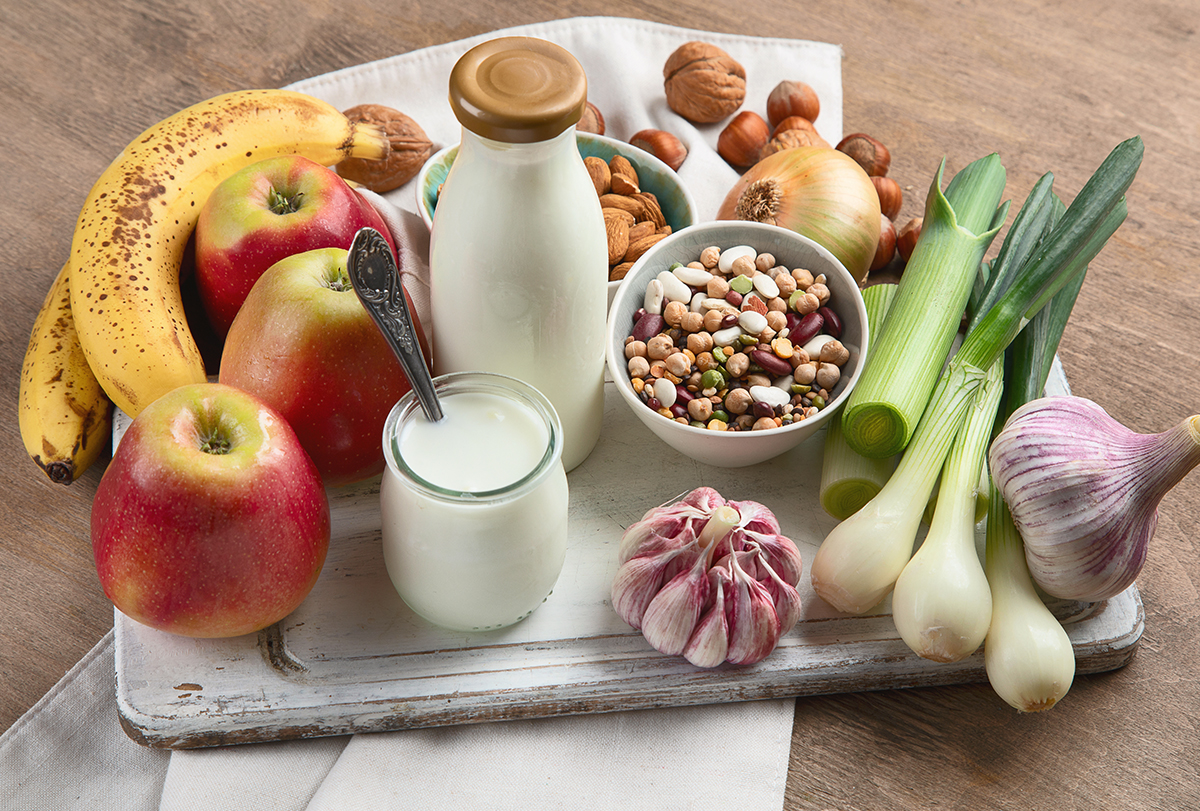
“Antibiotics” by definition are medications that kill or stop the growth of disease-causing bacteria in the body. They are used in the treatment of infectious diseases and have become indispensable in today’s world. (1)
However, certain side effects are associated with antibiotic use. Take a deeper look at them and learn how to avoid them in this article. (2)
Ways to Deal With Antibiotic Side Effects
Antibiotics can have a range of side effects from nausea, diarrhea, and stomach ache to weakness, loss of appetite, and rarely yeast infections.
Here are some easy tips to counter these side effects.
1. Increase your fiber intake
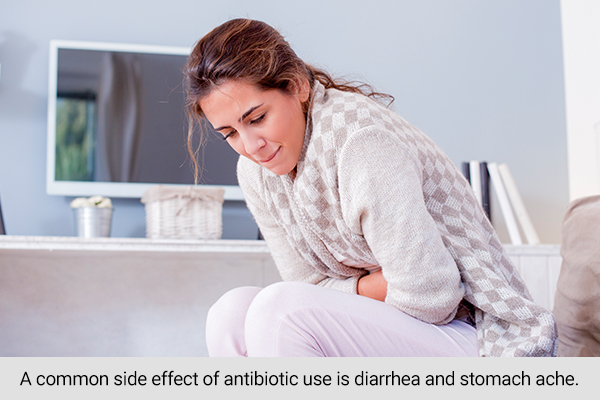
A common side effect of antibiotic use is diarrhea and stomach ache. Diarrhea associated with antibiotic use occurs due to the disruption of the gut’s natural bacteria.
A high-fiber diet can prevent these effects and help you poop normally since fiber provides nourishment to gut bacteria. Some examples of fiber-rich foods are bananas, lentils, beans, and apples.
2. Try supplementing with probiotics or probiotic-rich foods
Probiotics are another helpful remedy for antibiotic-induced diarrhea. Since antibiotics cannot differentiate between good and disease-causing bacteria, they often disrupt and reduce healthy gut bacteria.
Probiotics contain beneficial bacteria that are also found in your digestive system and help replenish their colonies after a dose of antibiotics. You can ask your doctor to prescribe a probiotic along with the antibiotic you are taking. (4)
Do not take probiotics for 2 hours before and after taking the antibiotic medicine. (5)
3. Try immune-boosting herbs
The best way to fight off the ill effects of any disease, medication, or parasite is by having a robust immune system. Several natural remedies can help boost your immunity and make you stronger. Some of them also contain antibacterial qualities that may aid in fighting the infection.
Mushrooms, garlic, berberine, neem, etc., are all potent natural remedies you can try along with antibiotics (with your doctor’s approval, of course). (6)
4. Drink ginger tea
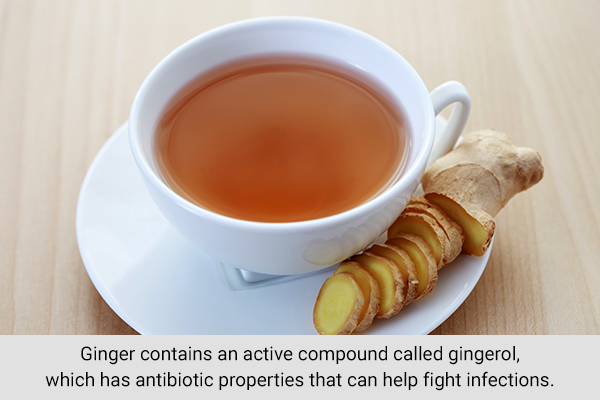
Ginger contains an active compound called gingerol, which has antibiotic properties that can help fight infections.
Ginger also contains several antioxidants and anti-inflammatory agents that can soothe an irritated stomach and provide relief from diarrhea.
You can make ginger tea by adding grated ginger to 2 cups of water. Boil this tea and strain it before drinking. You can add some lemon and honey for flavor. (7)
5. Take milk thistle supplements
Strong medications such as high-dose antibiotics can have harmful effects on your liver, where the antibiotic is broken down. Fortunately, some beneficial natural herbs can alleviate these side effects and protect your liver. Milk thistle is one of them. (8)
The active ingredient silibinin in milk thistle is a detoxifying agent and helps protect liver cells from damage. Another ingredient present in milk thistle, silymarin, may also help keep your liver cells healthy. (9)
You can ask your doctor whether it is safe to consume milk thistle supplements along with the antibiotic you are being prescribed.
6. Eat plenty of vegetables and avoid excessive sugar and starch
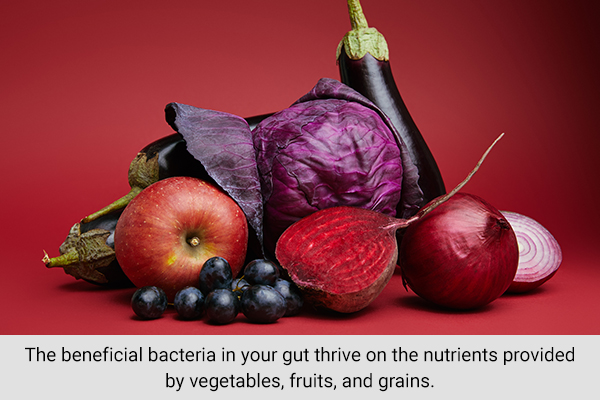
The beneficial bacteria in your gut thrive on the nutrients provided by vegetables, fruits, and grains. On the other hand, low-nutritional-value foods such as processed dairy, meat, or sugar-loaded items are fuel for pathogens.
The nutrients present in green leafy vegetables also help boost your immune system. (10)
7. Avoid grapefruit, excessive calcium, and alcohol
Grapefruits contain “furanocoumarins,” a group of compounds that can interfere with the absorption mechanism of antibiotics in the body. (11) The same may happen with calcium supplements. Excessive calcium will prevent the absorption of the medication in the bloodstream. (12)
Alcohol is also another thing you should avoid when you’re on antibiotics. It can cause increased heart rate, dizziness, stomach problems, and drowsiness. (13)
8. Talk to your doctor
Consult your doctor immediately if you experience severe vomiting, diarrhea, weakness, etc., after taking an antibiotic.
Antibiotic Side Effects That Affect the Digestive System
There are many side effects of antibiotic medications. Most of these affect the digestive system, such as stomach ache, diarrhea, vomiting, and nausea. (14)
Antibiotic allergic reactions
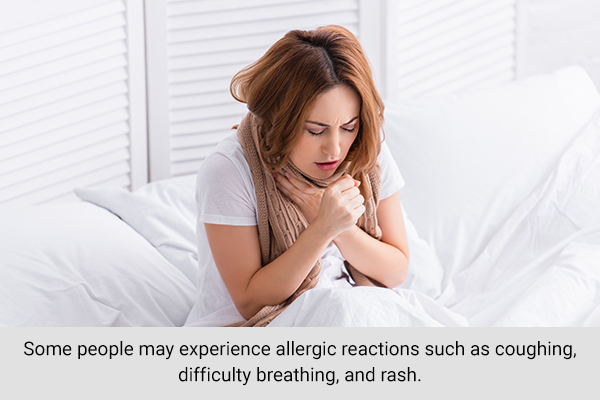
Some people may also experience allergic reactions such as coughing, difficulty breathing, and rash. Rarely, severe allergic reactions may cause anaphylaxis in some people.
Tetracyclines and sensitivity to light
A group of antibiotics called tetracyclines make some people sensitive to bright light. It may cause a skin rash, discoloration, or itching. (14)
Fluoroquinolones
Fluoroquinolones may cause joint issues. It also causes severe pain in muscles and joints. They can also have potentially serious side effects in people with heart disease. (14)
Final Word
Antibiotic medications have become a crucial part of the healthcare system. Unfortunately, they are associated with some side effects that can range from mild to severe.
Do not take antibiotics without a doctor’s prescription. Contact a doctor immediately if you experience severe vomiting, diarrhea, swelling, or wheezing.
- Was this article helpful?
- YES, THANKS!NOT REALLY


